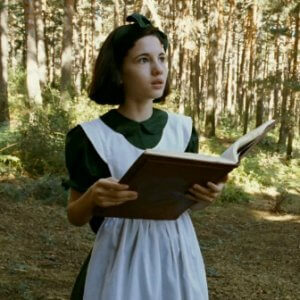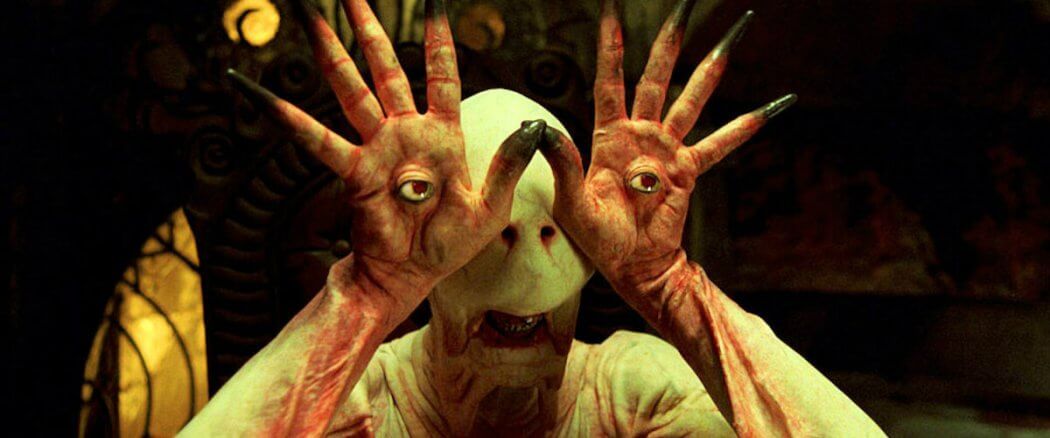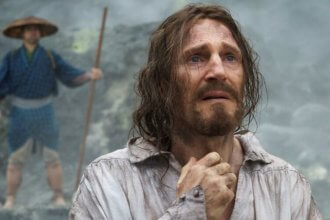From director Guillermo del Toro comes a work of fantasy between two conflicting myths: the modern myth of might and materialism and the pagan world of wonder, humility, and sacrifice.
The film centers around the young girl Ofelia who travels with her expecting mother to a rural Spanish army base which her father, the Captain, commands. On the way, her curiosity leads her to free a fairy which leads her to a Faun who tells her she may be the daughter of the King of the Underworld. To prove that she is untainted by the world and worthy to return to the Underworld, she must complete three tasks before the moon is full. Intersected with her story are the stories of her stepfather Captain Vidal who is under orders to crush the local rebels, his chief of staff Mercedes who is aiding them, and her mother who may lose her life with her baby.
Many things can and should be said about this film. First, while it’s well worth the watch, it’s also not appropriate for children. It may seem like a kids film on the surface, but don’t be fooled. More importantly, this film is full of really strong female characters; actually, almost every protagonist is a woman (Ofelia, Mercedes, and Ofelia’s mother). Most relevant for this review is the way Faerie interacts with the material world with almost no one knowing it, and how the ultimate fate of Vidal and Ofelia is fairly similar to ours.
The Eyes of Faith
Ofelia’s story is based on this tale of the lost princess of the Underworld recounted at the beginning of the movie:
“A long time ago, in the underground realm, where there are no lies or pain, there lived a Princess who dreamed of the human world. She dreamed of blue skies, soft breeze, and sunshine. One day, eluding her keepers, the Princess escaped. Once outside, the brightness blinded her and erased every trace of the past from her memory. She forgot who she was and where she came from. Her body suffered cold, sickness, and pain. Eventually, she died. However, her father, the King, always knew that the Princess’ soul would return, perhaps in another body, in another place, at another time. And he would wait for her, until he drew his last breath, until the world stopped turning…”
 This story may or may not be true, and Ofelia, the main character, may or may not be that princess. What happens if the Faun is tricking her or is just her imagination? What happens if she fails? Torn between the tasks given by the Faun and caring for her ailing mother, can she complete them in the time allotted? Will her mom survive her troubled pregnancy? As for Mercedes, how long can she support the rebels before it costs her her life? Will everyone be consumed by Vidal’s pursuit of victory at all costs?
This story may or may not be true, and Ofelia, the main character, may or may not be that princess. What happens if the Faun is tricking her or is just her imagination? What happens if she fails? Torn between the tasks given by the Faun and caring for her ailing mother, can she complete them in the time allotted? Will her mom survive her troubled pregnancy? As for Mercedes, how long can she support the rebels before it costs her her life? Will everyone be consumed by Vidal’s pursuit of victory at all costs?
Obviously there’s a lot going on; however, it’s what’s in the background that is particularly interesting. Ofelia acts as a bridge between the slowly dying world of Faerie and Vidal’s Modern world, and even though Ofelia regularly communicates with fairies and the Faun, no one else ever sees or is aware of the magic happening all around them. Part of the reason seems to be that Ofelia is the only one curious to wander away from the crowd or wonder what might be at the heart of the labyrinth, so she alone learns its secrets. Beyond her inquisitiveness, Ofelia’s faith – or perhaps innocence – seems to actually allow her to see into the Faerie world, which is apparently invisible to the grownups around her.
[Warning: the rest of the review will contain spoilers]
The Heart of Christianity
The most important aspect of the film is how Ofelia dies. Convinced she has failed the Faun’s last two tasks, and knowing that Vidal will try to kill her, she still risks everything to save her infant brother – who has done nothing for her except cause her mother’s death. She embraces defeat, because anything less would be even more costly. In the end, her self-sacrifice is lauded, but in the moment all the audience can hope for is that Mercedes will hunt Vidal down (and she doesn’t disappoint); nevertheless, Ofelia embraces the defeat of death.
Del Toro is not crafting a Jesus figure; nothing said or done earlier suggests that. That said, the connection works. Christians don’t worship a God like Vidal, but one remarkably like Ofelia, who operates in and through, and yet largely unbeknownst to, the Modern world, and who wields a strength that doesn’t seek to crush his enemies, but dies on behalf of them. This story of seeming defeat turned into victory lies at the heart of Christianity. All our ethics, all our doctrines, all our politics must come from Golgotha.
God’s Got This
All this is not to say that the worlds conceived by Christianity and del Toro’s fairy tale are the same. They’re not, and more importantly the writers aren’t trying to make that connection. Her fairy tale world obviously prioritizes the soul over the body, while Scripture irrevocably unites the two. Also, her world is dying under the onslaught of a world consumed by their worship of the Modern myth. While some segments of Christianity seem to believe this is happening, Scripture never teaches this. The One God is guiding the world to his future of peace already secured in Jesus.
That said, points of connection abound, especially the contrast between Vidal and Ofelia’s pursuit of immortality. Paganism, Modernity, and Christianity all demand a person’s undying allegiance. Vidal is willing to kill, torture, and endanger the lives of those he claims to love to prove himself, to give an answer to the demands of his watch. And while all his effort and cruelty are rendered meaningless, his conquerors are only different in their ideals, not their myth. The mighty has fallen and the lowly crush him to become a more moral version of themselves. Only Ofelia breaks out of the cycle of violence; only she gives her life away on behalf of another, to die and awaken in glory.





